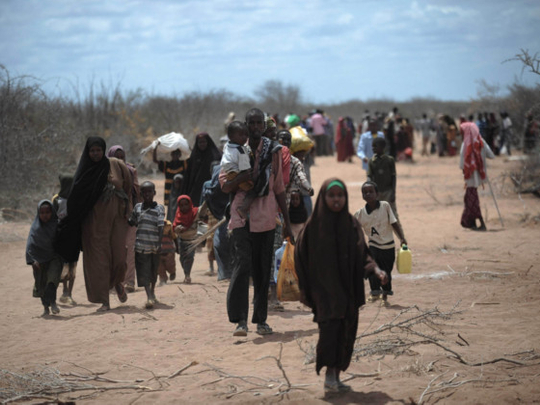
Dubai: Their numbers are increasing and it's alarming.
More and more families are fleeing their homes and becoming “refugees”. Last year alone, some 7.6 million people either became refugees outside their countries or were internally displaced due to conflict or persecution. Of these 6.5 million were newly displaced within the borders of their own countries while 1.1 million were new refugees.
Shockingly enough, “this translates to a new refugee or internally displaced person every 4.1 seconds,” a recent UN report said. “An average of 3,000 people per day became refugees in 2012, five times more than in 2010,” the report said.
‘Take one minute to support a family forced to flee’, is this year’s theme of the annual report of the United Nations High Commissioner for Refugees (UNCHR) in commemorating “International Refugees Day” on Thursday, June 20.
Focusing on families rather than individuals, as has been the case in previous years, is “because we want show people that we are talking beyond one person, one figure,” said Mohammed Abu Asaker, UNHCR spokesperson in UAE.
“We are talking about refugees as families,” Abu Asaker, who is based in Abu Dhabi, explained to Gulf News.
Children below the age of 18 make up 46 per cent of all refugees, a UNHCR press statement revealed. Also, there were 21,300 asylum applications submitted during 2012 from children who were unaccompanied or separated from their parents.
Most of them were Afghan and Somali children, and this constitutes “the highest number of unaccompanied or separated children that UNHCR has recorded,” the UN statement added. The children lodged their applications in 72 countries. Women and girls accounted for 48 per cent of the refugee population in 2012, a proportion that has remained constant over the past decade.
The UNHCR, which was established in 1950 by the UN General Assembly, is mandated to lead and coordinate international action to protect refugees and resolve their problems worldwide. It tries to ensure that they exercise the right to seek asylum and take refuge in other states. It also gives them the option to return to their home countries voluntarily, integrate locally or resettle in a third country. In more than six decades, the agency has helped tens of millions of people restart their lives.
By the end of 2012, more than 45.2 million people were in a situation of displacement, compared to 42.5 million at the end of 2011. According to UN figures, some 15.4 million people were refugees in 2012 and 10.5 million of them came under the mandate of UNHCR.
However, there are another 4.9 million Palestinian refugees registered by the United Nations Relief and Working Agency (UNRWA), which was established in 1949 specifically and solely to provide Palestinian refugees with relief and human developments services.
Wars and conflicts continued to be main reason forcing people to flee their homes. Other causes include persecution, violence and human rights violations. Nearly half of the refugees listed come from five war-affected countries — Afghanistan, Somalia, Iraq, Syria and Sudan.
While Afghanistan remained the “world’s top producer of refugees, a position it has held for 32 years”, other nations on the list include Mali, the Democratic Republic of Congo, Ethiopia and Sudan.
On the other hand, Pakistan is the world’s major refugee-hosting nation, with nearly 1.6 million refugees, the biggest number of refugees in any country. It is followed by Iran, with 868.200 refugees and Germany with 589,700 people.
At the same time, by receiving 70,400 asylum applications in 2012, the United States was the world’s largest recipient of new individual applications, followed by Germany with 64,500 applications, South Africa with 61,500 and France with 55,100 applications, the UN said.
Apart from finding a political solution to their predicament, the UN agency attempts to allow refugees “keep a normal life” through the provision of basic needs such as food, drinking water, education and health services, Abu Asaker said. Shelter and education rank high on the priorities list.
However, the increasing number of refugees who are suffering is increasingly becoming a source of concern to the international community. To show the size of the problem, almost 20 people will have been displaced by the time a reader finishes this article.












